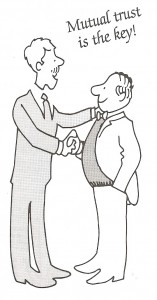“Made a searching and fearless moral inventory of ourselves”
“Step Four. It is the beginning of a lifetime practice in gaining a meaningful perspective or yourself.” So counseled the Sponsor to his Sponsee as they shared a hefty piece of apple pie alamode at Fellowship Hall.
SPONSEE: Yeah. But what’s in it for me? After all, I have gone to ninety meetings in ninety days. Why an Inventory?
SPONSOR: Your inventory, a searching and fearless one, will give you the confidence to face yourself and your demons.
SPONSEE: I’m sober. I’m smart. In fact, I am walkin’ piece of art.
SPONSOR:(To the waitress.) “Another round of apple pie alamode, for my friend here. I think we are going to be here awhile.”
SPONSEE: (Thinking to himself.) “This guy is so slow on the uptake.
SPONSOR: I used to think that I lived a pretty good life before old John Barleycorn cut me down. I honestly felt that the good man I thought I was would reappear the moment I swore off the “sauce.” No inventory needed for me, so I thought.
SPONSEE: That is just how I feel.
SPONSOR: Now I have come to realize that my problems were of my own making. I have come to learn that my alcoholism was a mere product of my self-centered behaviors. I could never get enough of what I really wanted: more this and more that… especially more approval. And “MORE” was never enough. I was encumbered with the disease of “MORE.” It left me empty.
SPONSEE: You mean to say that you needed a real brain flossing?
SPONSOR: I hope you can learn from the research I have already done for you. But perhaps another round of incomprehensible demoralization is in your future.
SPONSEE: I have ninety days with ninety meetings under my belt. Can’t we just skip Steps Four and Five?
SPONSOR: Not on your life, and it is your life that we are dealing with.
SPONSEE: Okay, I get it.
SPONSOR: And I hope you do get it, or you are going to get got by this cunning, baffling and powerful disease.
SPONSEE: What an order. I cannot go through with it.
SPONSOR: Do not be discouraged. You are not the first recovering drunk in search of a miracle. Just suit up, show up and the miracle will find you.
SPONSEE: So when do we get started on Step Four? What do you expect that we will learn?
SPONSOR: I expect that we will learn that your drinking was the product of your self-centered and grandiose thinking.
SPONSEE: I am good with what you say. Anything else? A third piece of pie alamode perhaps? (“Geeze this guy can pack it away).
SPONSOR: When you become willing to do a thorough Fourth Step, you will find that it will bring you both sobriety and the joy of knowing you are living a life to a good and useful purpose. That is the miracle. And this miracle continues to happen each day as we continue to trudge down this road of happy destiny together. And let’s do it together.
~ Sugarhouse Men’s Group
3280 East 3900 South, Salt Lake City
Mondays & Fridays 8:15pm

